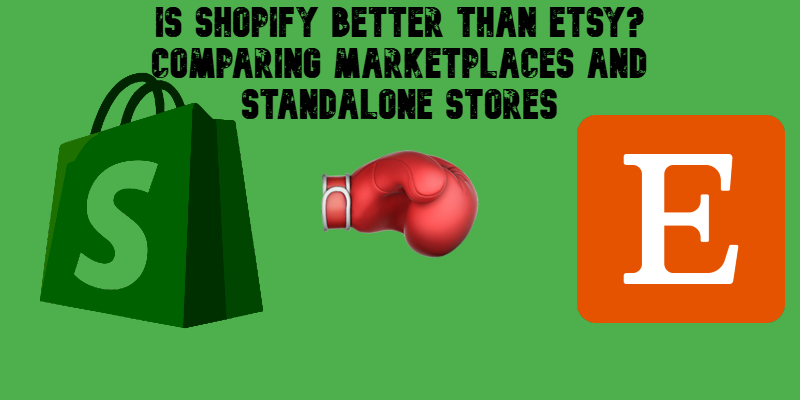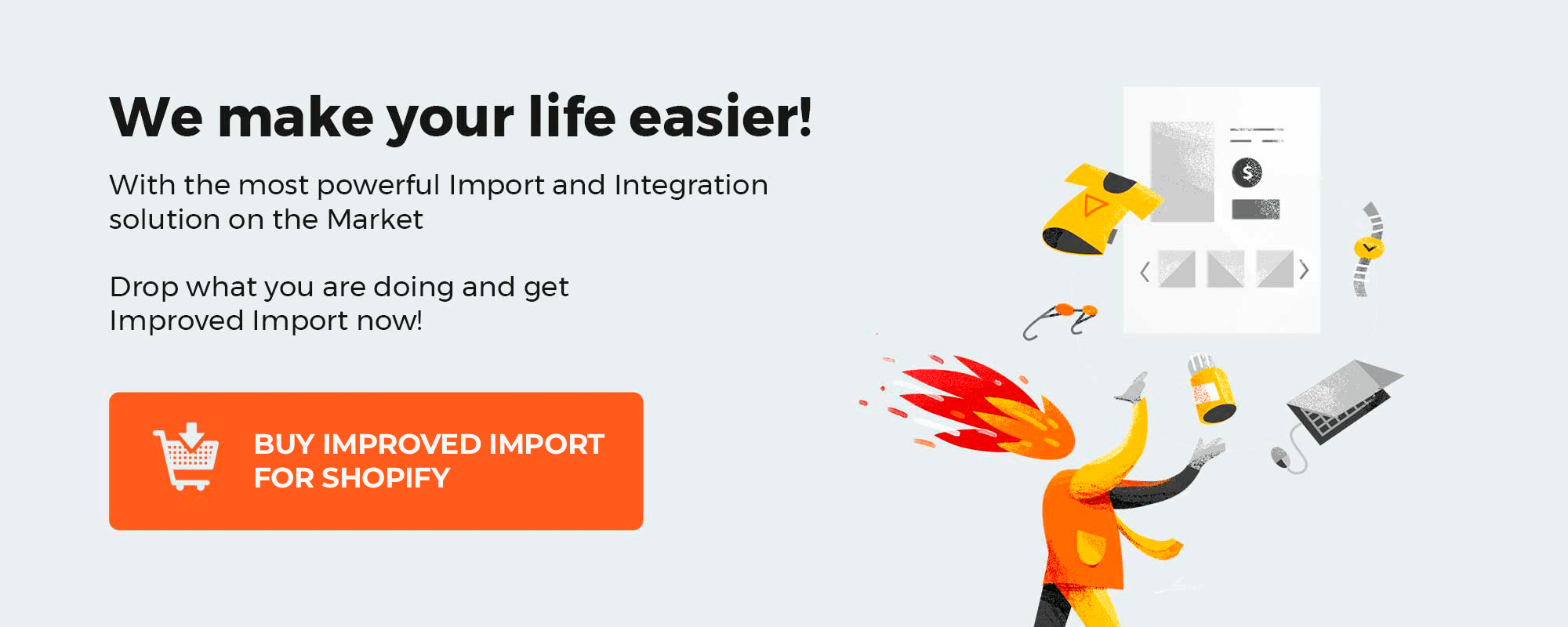Is Shopify Better Than Etsy? Marketplace vs. Standalone Store

For online entrepreneurs looking to sell their products, two platforms often stand out: Shopify and Etsy. Both are giants in the e-commerce world, yet they cater to distinctly different needs. Shopify is known for empowering businesses to create standalone, fully customizable online stores, while Etsy operates as a bustling marketplace specifically for handmade, vintage, and craft items. If you’re deciding between these two platforms, the question arises: Is Shopify better than Etsy?
The answer depends on your goals as a seller. Are you looking to tap into an established audience with a marketplace like Etsy? Or do you want the flexibility and control to build your own brand through a Shopify store? Each platform has its strengths and weaknesses, offering unique benefits to different types of sellers.
In this article, we’ll dive into the advantages and disadvantages of selling on Etsy vs. Shopify, exploring how Shopify’s standalone website model compares with Etsy’s marketplace approach. Whether you’re a hobbyist just starting out or a business owner aiming to scale, understanding the differences between these platforms is crucial for making the right choice. Also, follow our full Shopify vs. Etsy showdown to see other aspects of both platforms.

Table of contents
- Is Shopify Better Than Etsy? The Core Difference Between Selling on Marketplace vs. Standalone Website
- Advantages of Selling on Etsy’s Marketplace: Enter The Crowded Bazaar
- Disadvantages of Etsy: The Marketplace Downsides
- Advantages of Selling on Shopify: It’s Your Own Property
- Disadvantages of Selling on Shopify: Work Harder Than Expected
- Etsy vs. Shopify: Which Is Better for You?
- Conclusion: Is Shopify better than Etsy?
- FAQ
Is Shopify Better Than Etsy? The Core Difference Between Selling on Marketplace vs. Standalone Website
When comparing Etsy or Shopify for e-commerce, the most significant distinction lies in their core approach. Etsy operates as a marketplace, a centralized hub where sellers list their products alongside thousands of others. Think of it as setting up a stall in a busy bazaar — it’s vibrant, crowded, and filled with potential buyers actively searching for handmade, vintage, or unique goods. On the other hand, Shopify allows you to build a standalone e-commerce store, essentially your own boutique where you control every aspect, from branding to the customer experience.
Opportunities and Challenges of Selling on Etsy
The primary advantage of selling on Etsy is its massive built-in audience. Shoppers come to Etsy ready to browse and buy, making it easier for new sellers to gain visibility without significant marketing efforts. However, this comes with challenges. Sellers compete directly with similar products, and Etsy’s platform limits branding opportunities. Your store is part of a shared marketplace, which means it’s harder to establish a unique identity.
Opportunities and Challenges of Selling on Shopify
With Shopify, you’re not limited by the constraints of a marketplace. You have complete control over your Shopify store vs. Etsy shop, from designing your layout to owning your domain name. This is ideal for businesses looking to scale and build a strong, recognizable brand. But selling on Shopify also requires you to generate your own traffic through marketing efforts like SEO, social media, and advertising—a task that can be time-consuming and costly.
So, is Shopify better than Etsy? The choice hinges on your goals: whether you prioritize Etsy’s built-in audience or the branding freedom Shopify provides. Let’s be more specific.
Advantages of Selling on Etsy’s Marketplace: Enter The Crowded Bazaar

A lively marketplace offers immediate exposure to a built-in audience, ideal for small-scale sellers looking to connect with ready-to-buy customers.
While considering when Etsy is better than Shopify, it’s essential to explore what makes the marketplace a compelling choice for many sellers. As a platform dedicated to handmade, vintage, and craft items, Etsy offers unique advantages that cater especially to small-scale creators and hobbyists.
Built-In Audience and Traffic
One of Etsy’s greatest strengths is its built-in audience. The platform attracts millions of shoppers actively searching for handcrafted and vintage goods. For sellers, this means immediate exposure to potential buyers without the need to invest heavily in marketing or SEO. Unlike a Shopify store, which requires you to generate your own traffic, Etsy provides a steady stream of visitors who are ready to purchase.
Ease of Setup
For new sellers or hobbyists, selling on Etsy is incredibly straightforward. The platform’s onboarding process is simple, allowing you to list your products and start selling in minutes. Compared to setting up a Shopify store vs. Etsy shop, Etsy is far less intimidating for beginners who want to test the waters without navigating the complexities of designing a standalone website.
Community and Discoverability
Etsy fosters a sense of community among its sellers and buyers. The shared marketplace format enhances discoverability, as buyers browsing one store can easily stumble upon another. This interconnected ecosystem is particularly advantageous for sellers who are just starting out and want to benefit from Etsy’s reputation and network effect.
As you can see, Etsy’s marketplace model offers immediate exposure, simplicity, and a supportive community, making it a great choice for creators looking to reach an audience quickly. However, as we’ll explore further, these advantages come with limitations that Shopify addresses for those seeking full branding and scalability.
Disadvantages of Etsy: The Marketplace Downsides
While Etsy offers many benefits, it’s not without its challenges. For sellers asking “Is Shopify better than Etsy?”, understanding the downsides of the marketplace model is crucial. From intense competition to limited control over branding, these drawbacks might influence your decision between Shopify vs. Etsy.
Fierce Competition
One of the most significant challenges of selling on Etsy is standing out in a crowded marketplace. With thousands of sellers offering similar products, potential customers can easily navigate away to competing shops. This level of competition often forces sellers to lower prices or invest in advertising just to stay visible, which can cut into profits. Unlike a Shopify store, where you own the platform and control your customer’s journey, Etsy’s shared marketplace pits sellers directly against one another.
Lack of Branding Control
Etsy limits how much you can customize your storefront. As a seller, you can only add a logo or banner, but the overall design and layout are standardized across the platform. This makes it difficult to establish a unique identity or create a memorable customer experience. By contrast, a Shopify store allows complete control over branding, enabling businesses to stand out and build long-term recognition.
Fees and Limitations
Another downside of selling on Etsy is its fee structure. Sellers face listing fees, transaction fees, and additional charges for payment processing. These costs can add up, especially for those with high-volume sales. We detailly explore the fees associated with selling on both platforms here: Shopify vs. Etsy Fees Comparison.
Additionally, Etsy enforces strict marketplace policies, which can sometimes restrict sellers’ creativity or operational freedom. In comparison, Shopify has a more predictable pricing model, giving sellers greater financial clarity. You can learn more about it here: Shopify Cost Breakdown.
When weighing Etsy or Shopify for e-commerce, it’s clear that Etsy’s marketplace model, while accessible, comes with notable limitations. For sellers seeking more control, fewer fees, and less competition, Shopify might present a better alternative.
Advantages of Selling on Shopify: It’s Your Own Property

An individual store allows sellers to showcase their unique brand and products with complete creative control over design and presentation.
Below, we explain when and why Shopify is better than Etsy. One of its standout features is the ownership it grants sellers over their online store. Unlike Etsy’s shared marketplace, Shopify provides a platform where your store is entirely your own property. This independence comes with several key advantages.
Total Branding Freedom
With Shopify, you have complete control over your store’s design, domain name, and user experience. From selecting color schemes and fonts to customizing layouts, your Shopify store reflects your brand’s unique identity. This level of freedom allows you to create a memorable shopping experience that resonates with your target audience. Compared to an Etsy shop, which follows a standardized format, Shopify enables sellers to build a distinct and professional brand presence.
Scalability
Shopify is an excellent choice for businesses aiming to grow. Its robust features and integrations make it ideal for scaling operations, whether you expand your product line, target new markets, or increase order volumes. Unlike Etsy, which can feel limiting as your business grows, Shopify supports advanced tools like inventory management, analytics, and marketing automation, giving you the flexibility to scale without constraints. When comparing Shopify vs. Etsy, Shopify shines as the better option for long-term growth and scalability.
Direct Relationship with Customers
One of the most significant advantages of selling on Shopify is the direct connection it allows with your customers. Without a marketplace acting as a middleman, you own your customer data, enabling personalized communication, loyalty programs, and marketing campaigns. This direct relationship builds trust and enhances customer retention — something that’s harder to achieve on Etsy, where customers often focus on products rather than sellers.
When evaluating Etsy or Shopify for e-commerce, Shopify offers unmatched freedom, scalability, and ownership. For sellers who want to establish a strong brand and grow their business on their own terms, Shopify is the clear winner. But what about the downsides?
Disadvantages of Selling on Shopify: Work Harder Than Expected
While Shopify offers independence and scalability, it comes with its own challenges. Sellers comparing Shopify vs. Etsy must consider the extra effort required to succeed on Shopify. Unlike Etsy, Shopify lacks a built-in audience, which means you need to take on the heavy lifting of driving traffic and managing additional costs.
Generating Your Traffic
One of the biggest challenges of selling on Shopify is the absence of a built-in audience. Unlike Etsy, where millions of buyers are actively searching for products, Shopify store owners must generate their traffic through marketing strategies like SEO, paid ads, and social media campaigns. For some entrepreneurs, this is an exciting opportunity to build their brand. For others, it can feel like a daunting and time-consuming task. So keep in mind that Shopify’s success heavily depends on your ability to attract and retain customers.
Higher Initial Investment
Another downside of Shopify is its higher initial investment. While Etsy charges listing and transaction fees, Shopify requires a monthly subscription fee, with additional costs for premium themes, apps, and marketing tools. These expenses can add up quickly, particularly if you’re just starting. For small-scale sellers used to Etsy’s pay-as-you-go model, Shopify’s upfront financial commitment might be a hurdle. However, for those planning to scale, the investment can pay off in the long run.
When deciding whether Shopify is better than Etsy, it’s essential to weigh these disadvantages against Shopify’s benefits. While Etsy offers simplicity and immediate exposure, Shopify requires more effort and investment but provides greater long-term rewards. Let’s summarize everything to help you choose the platform that works best for you.
Etsy vs. Shopify: Which Is Better for You?
Below is a comparison table to help you evaluate the core features of Shopify vs. Etsy and make the best choice for your e-commerce journey.
| Etsy | Shopify | |
| Customizability | Limited; standardized storefront with minor branding options. | Fully customizable; control over design, domain, and user experience. |
| Scalability | Moderate; suited for small-scale sellers and hobbyists. | High; supports business growth with advanced tools and integrations. |
| Traffic | Built-in audience; no need to generate traffic. | Requires effort to generate traffic via SEO, ads, and social media. |
| Fees | Listing fees, transaction fees, and additional payment processing fees. | Monthly subscription fees; additional costs for apps and themes. |
| Upfront Investment | Low; minimal setup costs make it accessible for beginners. | Moderate to high; investment in marketing, design, and tools is often necessary. |
| Branding Control | Limited; shared marketplace structure restricts individuality. | Total freedom to build and promote your brand identity. |
| Ease of Use | Beginner-friendly; quick setup with minimal technical skills required. | Requires more setup and a learning curve, but offers extensive support and resources. |
Conclusion: Is Shopify better than Etsy?
Now, let’s return to our main question: Is Shopify better than Etsy?
The answer ultimately depends on your business goals. If you’re a hobbyist or beginner looking for an easy way to reach a built-in audience, Etsy’s marketplace might be the better fit. Its simplicity and ready-made traffic make it ideal for testing the waters. However, if you’re focused on building a unique brand and scaling your business, Shopify’s freedom, customizability, and scalability offer unmatched opportunities. Both platforms offer unique advantages, and the choice ultimately comes down to your business priorities.
But why choose one when you can have the best of both worlds? By running an omnicommerce business — a Shopify website alongside an Etsy store — you can combine the branding power of Shopify with Etsy’s ready-made audience. This approach allows you to maximize sales channels, expand your reach, and create a seamless shopping experience across platforms.
To make this strategy even easier, Firebear offers the , which helps sync products, prices, and inventory between your Shopify store and Etsy shop. Whether you’re just starting out or scaling your e-commerce empire, our app can simplify the process and keep your business running smoothly.
Ready to take your e-commerce strategy to the next level? Evaluate your priorities, explore both platforms and consider integrating them for the ultimate selling experience. Reach out to Firebear today to learn how we can help you streamline your Shopify and Etsy operations.
FAQ
Is it better to have an Etsy or Shopify?
The choice between Etsy and Shopify depends on your business goals. Etsy is ideal for hobbyists and small-scale sellers seeking immediate exposure through a built-in audience. Shopify, on the other hand, is better suited for entrepreneurs who want full control over their brand, scalability, and the ability to create a unique online shopping experience. For many, the best solution might be to use both platforms to maximize reach and sales.
Why switch from Etsy to Shopify?
Switching from Etsy to Shopify is often a strategic move for sellers looking to grow their brand. Shopify offers complete customization, no direct competition on your site, and the ability to build a distinct identity. Additionally, Shopify’s tools for marketing, inventory management, and customer data ownership make it a better option for scaling your business compared to Etsy’s limited branding and fee-heavy structure.
Which website is better than Etsy?
Shopify is often considered a superior choice for sellers looking to build and scale their own brand. Other alternatives to Etsy include platforms like BigCommerce, WooCommerce, and Amazon Handmade, each offering unique features and benefits. The best choice depends on your specific needs, such as customization, scalability, and the type of products you sell.
Is Shopify good for beginners?
Yes, Shopify is beginner-friendly. It offers a wide range of templates, intuitive tools, and a strong support network to help new sellers set up their online store. While it requires more effort than Etsy to attract customers, its scalability and branding options make it a worthwhile investment for those serious about growing their e-commerce business.
Can I use both Shopify and Etsy at the same time?
Yes, running both a Shopify store and an Etsy shop is a great way to leverage the strengths of each platform. Shopify gives you control over branding and scalability, while Etsy provides access to a built-in audience. Tools like the Firebear Import & Export Tool for Shopify can help sync products, inventory, and pricing across both platforms for seamless management.
Does Shopify have fees like Etsy?
Yes, Shopify charges monthly subscription fees starting at $29, and additional costs may apply for apps, premium themes, and marketing tools. Shopify also charges transaction fees unless you use Shopify Payments, which reduces their cost. Unlike Etsy, Shopify does not have listing fees, giving sellers more predictable costs.
What are the main differences between Shopify and Etsy?
The main difference lies in control and audience. Etsy is a marketplace with a built-in audience, but sellers share space with competitors and have limited customization options. Shopify, however, is a standalone platform where sellers build their own brand and control their customer experience but must generate their own traffic.
Can I migrate my Etsy store to Shopify?
Yes, migrating from Etsy to Shopify is possible and straightforward with tools like the Firebear Import & Export Tool. This ensures your products, inventory, and customer data are seamlessly transferred to your Shopify store without losing valuable information.
Is Etsy or Shopify better for handmade goods?
Etsy is the go-to platform for handmade goods because it attracts a dedicated audience seeking unique and handcrafted items. However, Shopify is ideal for sellers wanting to scale their handmade business and create a custom brand experience. Using both platforms can maximize visibility and sales.
What are the downsides of selling on Etsy?
The main downsides of selling on Etsy include high competition, limited branding opportunities, and fees for listing and transactions. Sellers often find it challenging to establish a unique identity on a shared marketplace. Shopify offers a solution by providing full control over branding and customer interactions.









